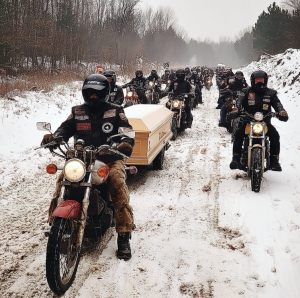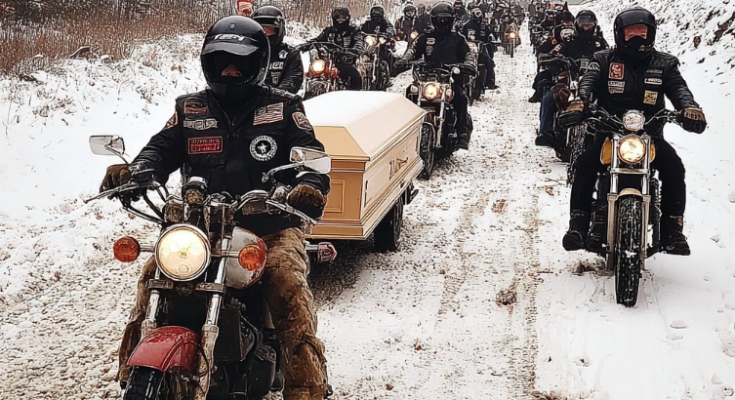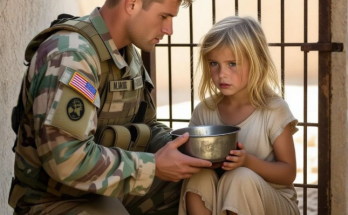When a soldier falls ill in service to his country, there is often a quiet ripple of sorrow that spreads through the ranks—men and women bound not just by duty, but by a deep, unspoken brotherhood. For Staff Sergeant Daniel “Danny” Cole, a 38-year-old veteran of two tours in Afghanistan, that brotherhood would prove stronger than even the harshest winter storm.
When word reached his fellow riders in the Patriot Guard—a volunteer motorcycle group dedicated to honoring veterans—that Danny was dying from terminal cancer and his last wish was to see his hometown in Montana one final time, they didn’t hesitate. Despite a brutal blizzard that blanketed the northern states in thick sheets of ice and snow, 47 bikers mounted their Harleys, Hondas, and Triumphs, and began a 1,200-mile ride across America. Their mission was simple but sacred: to bring a dying soldier home.
The journey began in Wichita, Kansas, where Danny had been receiving palliative care. Too weak to ride his own bike, he was carefully secured in a specialized sidecar built by one of the riders. The sidecar was lined with wool blankets, a U.S. flag, and a photograph of his unit taken in Helmand Province years before. As the engines roared to life that morning, the sky was gray, and the air was biting cold. Yet not a single rider hesitated. Their headlights cut through the fog like small stars, and together they rolled north, side by side, forming a steel convoy of loyalty and love.
The first day was unforgiving. The wind howled through the plains, slapping the riders with sleet and freezing rain. Tires slid on icy asphalt, and visibility often dropped to just a few feet. But the riders pressed on. Every few hours, they stopped to check on Danny. Even through the pain, his face held a soft smile. He would raise his trembling hand to salute the flag stitched on his brothers’ jackets.
At night, the group sought shelter in small motels or the homes of veterans who had heard about the journey through social media. People along the route began to take notice. Townsfolk lined the highways, waving flags and offering hot coffee, soup, and fuel. Some even handed over gas money, saying only, “Thank you for what you’re doing.” For many, it was a reminder of what true brotherhood—and patriotism—looked like in a divided world.
By the third day, the storm intensified. Snow piled knee-deep in some areas, and the wind cut like knives. The riders layered up, duct-taping gloves and boots to keep out the cold. Helmets iced over, and exhaust pipes steamed like dragons. It was a sight both humbling and heroic: men and women, covered in frost, their bikes growling defiantly against the storm.
When they reached South Dakota, the convoy was met by local police escorts who cleared the roads. One officer later said he had “never seen anything like it—forty-seven bikers risking everything just to make sure one of their own got home.” The group refused to turn back, even when temperatures dropped below zero. “He didn’t quit on his country,” one of the riders said. “We’re sure as hell not quitting on him.”
As the convoy neared Montana, the sun finally broke through the clouds. The snow still glistened, but the sky turned a deep, forgiving blue. Danny, though weak and pale, asked to sit up for the last few miles. The riders slowed down, forming a protective circle around his sidecar. Flags whipped in the wind as they crossed the state line. People had gathered on overpasses and along the roadsides, waving signs that read “Welcome Home, Hero” and “Thank You for Your Service.”
When they arrived in his hometown, the sound of engines echoed through the valley. Hundreds of locals, veterans, and families stood waiting. The sheriff, the mayor, and even Danny’s old high school football coach were there. As the bikers rolled to a stop in front of his parents’ home, silence fell. The engines cut, leaving only the soft crunch of snow and the sound of muffled sobs.
Two riders carefully lifted Danny from the sidecar and carried him to his front porch. His mother, tears streaming down her face, held his hand. “You made it home, baby,” she whispered. Danny’s eyes fluttered open, and for the first time in weeks, his breathing eased. He smiled faintly and said, “Couldn’t have done it without my brothers.”
That evening, as the sun set behind the mountains, the 47 bikers stood in formation outside the house. They removed their helmets and bowed their heads as the local church bell rang. Danny passed peacefully that night, surrounded by his family and the men who had carried him through the storm. His final words, according to his father, were, “Tell them… thank you for bringing me home.”
In the days that followed, news of the ride spread across the nation. Photos of frost-covered bikers escorting the flag-draped sidecar went viral. Veterans’ organizations called it one of the most powerful tributes ever witnessed. Strangers wrote letters and sent donations to the Patriot Guard Riders, thanking them for reminding the world what honor truly means.
A week later, at Danny’s funeral, all 47 riders were there again—this time riding in clear blue skies. They escorted his casket, draped in the American flag, to the small cemetery overlooking the valley. When the service ended, each biker placed a single patch from their jacket on his grave. Then, with engines rumbling softly, they saluted one last time before riding off together.
The snow melted in the weeks that followed, but the story of that journey didn’t fade. It became a symbol of devotion, courage, and the unwavering bond between soldiers—alive and fallen. They rode through a blizzard not for glory or recognition, but for love.


